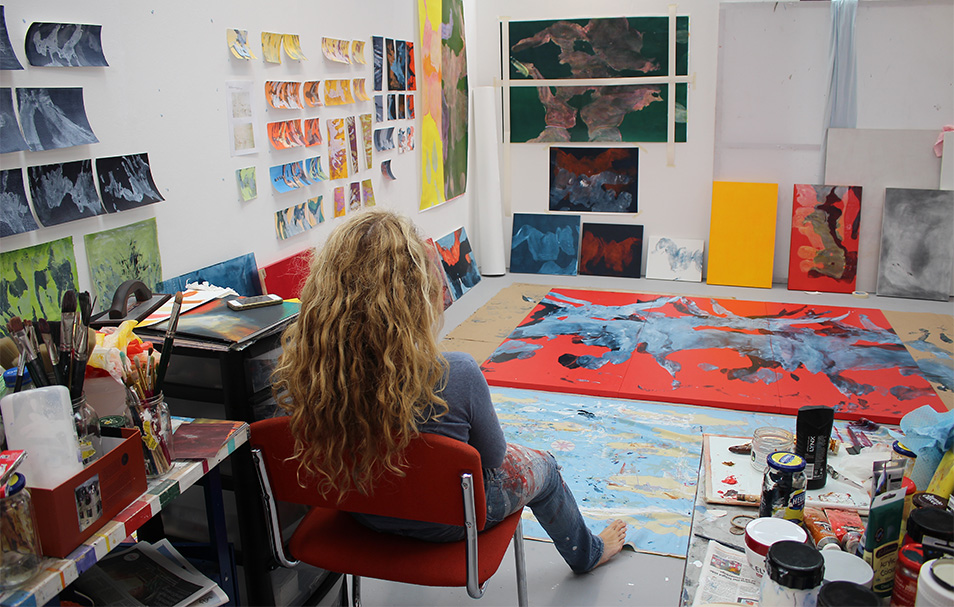Deborah Petch MA
Deborah is a multidisciplinary artist who works part time at West Dean College as the Arts Short Course Programmer. Deborah graduated with a Masters in Fine Art from University of Chichester in 2015. Her MA work consisted of large mixed media paintings on gesso and ply wood surfaces. Large ply wood panels were fastidiously prepared to yield incredibly smooth skin like surfaces, they were then painted with vibrant layers of oil paint and then over-layered by printing, through the use of paint and Deborah’s own body.
Deborah’s ‘Inklings’ are an intuitive expression of her journeying both physically and mentally. Through the Arts Council England funded project ‘Drawing Insight’ in 2017, Deborah made her epic sized ‘Inkscape – on Cissbury’ measuring 10 metres x 1.5 metres outdoors on the iron age hill fort of Cissbury Ring. A second ‘Inkscape – on the Trundle’ (dimensions of Deborah’s kitchen floor) became a series of framed works where she brought the outside in, and the inside out.
“Being a practicing artist is vital to me as it is an expression and an exploration into what makes us human and what it is to be alive. To be authentic to oneself is paramount and is essential to secure meaning, value, vitality and purpose into existence. I am a multi-sensory artist who questions how conscious thought is constructed and the implications of the unconscious, how we live in and experience time and reality. I aim to express my research on existential phenomenology and embodied experience in a visual form, in order to deepen my understanding of these complex ideas in order to make sense of the world we live in. Art allows me space and time to breathe, feel, touch, see, experience and think visually.”
Deborah attained a Fine Art Masters Degree at University of Chichester in September 2015.

‘Science tells us we are merely beasts, but we don’t feel like that. We feel like angels trapped inside the bodies of beasts, forever craving transcendence.’ (Ramachandran, 2012, p291)
My practice as research has become an interrogation of authenticity, identity and consciousness informed by Heidegger’s ideas on Dasein’s mode of being-in-the-world. The paintings I make are an ordinary history of experience, aiming to encompass time, not in a linear way but in the temporal way we exist; in a past, present and future that inter-twine. I aim to catch a sense of time, space and movement that embodies physical and experiential modes of human consciousness, encapsulating these ideas in a visual form.
Our consciousness is constructed from a perceived sense of unity, continuity, embodiment, privacy, social embedding, free will and self-awareness. Exploring these ideas through the alchemic qualities of paint, using my own body as a painting tool, I engaged with a private, personal, immediate and physical process, that allows me to connect with the world via the haptic.
Heidegger’s ideas on Dasein’s mode of being-towards-death and potentiality for being have informed my recent MA work. The ghostly imagery against the vibrancy of the panels reflects this. Spaces are left between the panels to imply the liminal quality of the work and my own transitional state of authenticity in the world.
Deborah Petch BA
Deborah gained a Fine Art Batchelors Degree with first class honours at Northbrook College, Worthing (affiliated to Brighton University) in June 2013.
[metaslider id=443]
My purpose in drawing is to make the ordinariness of nature extraordinary, as it really is.
I am fascinated by nature in its decayed state, a shadow of its former self, its life cycle echoing the transient nature of our own brief time on earth.
The shadows of the leaves are included, suggesting the light towards which all life grows. Light being a physical need and a metaphor for thought, knowledge and spiritual illumination.
The process of drawing a shadow moving across the paper revealed a realisation of the orbiting earth around the sun and our minute size within this world, an engaging moment of human consciousness. The large scale of my work allows me to focus on the tiny details which make up the cosmos, enfolded implicitly in each small corner of the natural world.
I have experimented with carbon and ash as drawing materials, enjoying the close relationship of dead organic substances to their living counterparts in the structure of plants.
The drawings are ‘human sized’, confronting us both with our own mortality and perhaps our own imperfect, fragile and dissolving beauty.